Arctic Research Seminar Series Registration
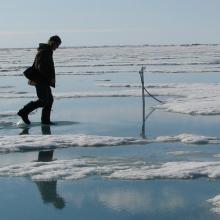
Registration is now open for the next ARCUS D.C. Arctic Research seminar/webinar featuring a presentation on observations and predictions of Arctic sea-ice use by Hajo Eicken of the University of Alaska Fairbanks. The event will be held Wednesday, 30 November from 12:00-1:00pm EDT. Registration is required for both the live event, held at the ARCUS D.C. office, and online webinar.
AGU Community Meeting Room Available
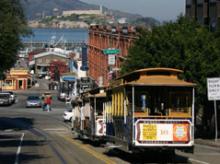
Meeting space for groups working on Arctic research and education activities will be available for use by appointment during the Fall Meeting of the American Geophysical Union (AGU). This space is provided by ARCUS to encourage scientific collaboration and to facilitate face-to-face meetings of opportunity.
Arctic Research Seminar Series Recording Now Available
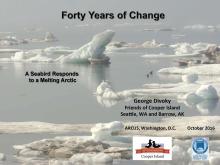
A recording of the last ARCUS D.C. Arctic Research seminar/webinar “Forty Years of Change: A Seabird Responds to a Melting Arctic” featuring George Divoky of Friends of Cooper Island is now available. George's presentation discusses the consequences of regional climate change for the Black Guillemots of Cooper Island, Alaska.
PolarConnect Event with PolarTREC Teacher Maggie Kane
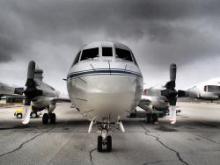
Join us for a PolarConnect Event with PolarTREC teacher Maggie Kane and the NASA Operation IceBridge Team. We will be hosting the PolarConnect event from the team's base in Punta Arenas, Chile on Wednesday, 2 November 2016 at 11:15am AKDT (12:15pm PDT, 1:15pm MDT, 2:15pm CDT, 3:15pm EDT).
This is a real-time event with Colorado teacher Maggie Kane and the research team. They will be sharing experiences and observations of their work flying above Antarctica. Read more about the research and what Maggie is learning here.
New Article Highlights SEARCH Executive Director's Beaufort Sea Research
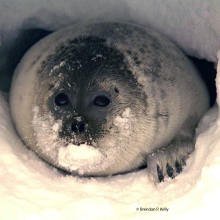
A new article from SEARCH Executive Director Brendan P. Kelly shares his 40 year history with marine mammal research in the Beaufort Sea. The story is featured in the Vital Arctic Ocean Areas blog designed to highlight important marine areas in the U.S. Arctic as identified by science.
ARCUS at National Park Service Symposium
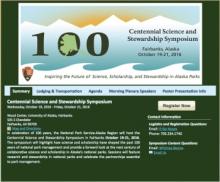
ARCUS will be represented at the National Park Service Centennial Science and Stewardship Symposium, which will be held in Fairbanks, Alaska on 19-21 October 2016. We will be participating in a panel on "Science Communication and Collaboration: Getting the Science from the Heads of the Researchers into the Hearts of the People" and will hold an Open House/Drop-in Event with light refreshments. Both events will take place Thursday, 20 October. We hope to see you there!
Arctic Research Seminar Series Registration
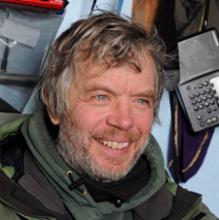
Registration is now open for the ARCUS D.C. Arctic Research seminar/webinar “Forty Years of Change: a seabird responds to a melting Arctic”. Featuring George Divoky of Friends of Cooper Island, the presentation will discuss the consequences of regional climate change for the Black Guillemots of Cooper Island, Alaska. The event will be held Wednesday, 26 October from 12:00-1:00pm EDT. Registration is required for both the live event, held at the ARCUS D.C. office, and online webinar.
ARCUS at the Arctic Circle Assembly
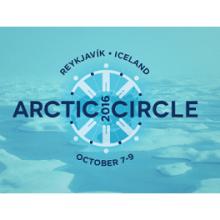
The Arctic Research Consortium of the U.S. (ARCUS) is participating in this week's Arctic Circle Assembly taking place 7-9 October in Reykjavik, Iceland. Please join us on 7 October, 3:30pm GMT in Ríma B of the Harpa Conference Center for the session "Essential Science for Informed Decision-Making in the Changing Arctic" and on 8 October, 2:30pm GMT in the Háaloft room for the session "How to Connect with Arctic Research Across Boundaries".
SIPN Webinar - "The 2016 Sea Ice Outlook (SIO) – Post Season Discussion"
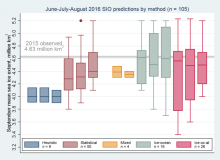
The Sea Ice Prediction Network (SIPN) announces open registration for a webinar entitled "The 2016 Sea Ice Outlook (SIO) – Post Season Discussion" presented by Larry Hamilton, University of New Hampshire, and Edward Blanchard-Wrigglesworth, University of Washington. This webinar will include a discussion of the 2016 Sea Ice Outlook (SIO) with a focus on the lessons learned from this season, what was new this season, and what areas could be improved for the future. Presentations will include a review and analysis of the outlooks contributed from 2008 to 2016, discussion of the 2016 summer sea-ice conditions that lead to the minima this year, and discussion of the SIO success and challenges at the local scale. Time for community discussion will follow the presentations. The webinar will be held Tuesday, 11 October 2016, 8:00am to 9:00am (AKDT).
PolarConnect Event with PolarTREC Teacher Cara Pekarcik
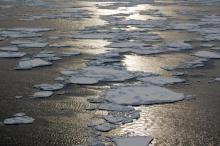
Join us for a PolarConnect Event with PolarTREC teacher Cara Pekarcik and the team studying Southern Ocean Diatoms on Monday, 3 October 2016 at 9:30am AKDT (10:30am PDT, 11:30am MDT, 12:30pm CDT, 1:30pm EDT).
This is a real-time event with Boston teacher Cara Pekarcik and the researcher team looking at Southern Ocean Diatoms. They will be sharing experiences and observations of their work aboard the R/V N.B. Palmer in the Southern Ocean off the tip of the Antarctic peninsula. Read more about the research and what Cara is learning here.
Webinar: Arctic Research to Promote Science Education and Citizen Empowerment
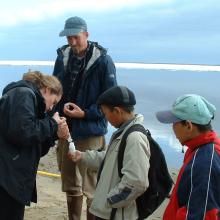
On 27 September ARCUS broadcast two important panel discussions with international Arctic leaders exploring the role that Arctic research plays in the empowerment of Arctic communities and to inspire learning in science, technology, engineering and mathematics. A recording of the event is now available featuring opening remarks by Mark Brzezinski (Arctic Executive Steering Committee) and panelists such as Fran Ulmer (USARC), Okalik Eegeesiak (Inuit Circumpolar Council), Tara Sweeney (Arctic Economic Council), Gunn-Britt Retter (Saami Council), Max Holmes (Woods Hole Research Center) and more.
Join the Newly Expanded Directory of Arctic Researchers
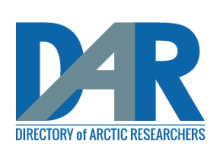
ARCUS invites the Arctic research community to join the newly expanded Directory of Arctic Researchers. The Directory has been revitalized to better meet collaboration needs of researchers like you who are interested in any aspect of the Arctic; who know the importance of being connected with colleagues around the world; want to be known by funders, government officials, and perhaps the media as an expert in those fields on which you are working; and want your research to be seen, used, and cited. It only takes a few minutes to join the Directory of Arctic Researchers!
PolarTREC 2017-2018 Application Period is Open
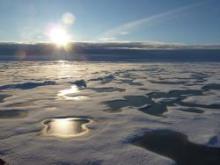
The PolarTREC program is happy to announce that the 2017-2018 Application Period is now open for teachers and researchers. The application deadline is Monday, 10 October 2016. For more information, click on the link below.
Arctic Science Ministerial Side-Event on Arctic Science, Education, and Citizen Empowerment

On 27 September ARCUS co-hosted a side-event to the 2016 White House Arctic Science Ministerial at our Washington, D.C. office. Scheduled to take place immediately before the opening events of the Ministerial, this special event highlighted one of the four key themes of the meeting: "Arctic Science as a Vehicle for STEM Education and Citizen Empowerment." The morning session featured two live-streamed panel discussions with Arctic educators, scientific researchers, and community leaders. In the afternoon, visitors were invited to learn about and participate in hands-on Arctic STEM activities and resources.
Arctic Research Seminar Series Registration
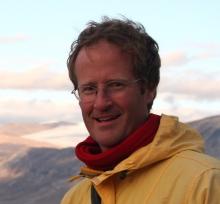
Registration is now available for the fifth ARCUS D.C. Arctic Research seminar/webinar “Some things I can't explain, or, Why more social science studies are needed to understand human-environment interactions in the Arctic”. Featuring Henry Huntington of Huntington Consulting, the presentation will discuss the social dynamics that shape human responses to climate and other types of change in the Arctic. The event will be held Tuesday, 13 September from 12:00-1:00pm EDT. Registration is required for both the live event, held at the ARCUS D.C. office, and online webinar.
PolarConnect Event with Nell Kemp
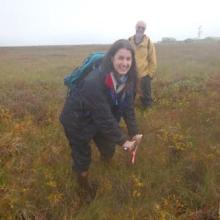
Join us for a PolarConnect Event with Nell Kemp and the research team! Wednesday, August 31, 2016 1:00pm AKDT (2pm PDT, 3pm MDT, 4pm CDT, 5pm EDT). This is a real-time event with teacher Nell Kemp and the researchers looking at the tundra ecosystems. They will be sharing experiences and observations of their work from Toolik Field Station and Healy, Alaska. This will be a 1 hour event with a Q&A at the end for teachers, students, friends and family. Learn more about Deep Roots and read the latest journals here.
Sea Ice Prediction Network Webinar - Archive Available

The archive is now available for the 23 August 2016 Sea Ice Prediction Network (SIPN) webinar presented by Walt Meier, NASA Goddard Space Flight Center and entitled "Uncertainty in Satellite-Derived Sea Ice Extent Estimates.” The archive includes a video of the webinar, presentation slides, and a list of webinar participants.
This webinar, organized by Muyin Wang and the SIPN Leadership Team, focused on uncertainty in sea ice extent estimates from remotely-sensed data. Meier discussed the current understanding of related issues and proposed various methods of estimating extent uncertainty, with the aim of improving analyses of sea ice extent trends and variability. A question and answer session with participants followed the presentation.
ARCUS Seeking Administrative Assistant
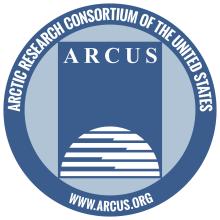
We are seeking an enthusiastic, organized, and detail-oriented Administrative Assistant for our Fairbanks, Alaska office. This part-time position provides support to the diverse activities of ARCUS, including assistance with office operations and our science planning, education, and outreach projects. Application review begins on Thursday, 15 September 2016 and the position will be open until filled.
2016 Sea Ice Outlook August Report Available
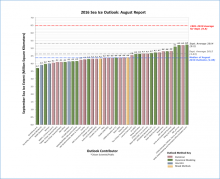
The August report for the 2016 Sea Ice Outlook (SIO) is now available! The goal of the SIO is to improve Arctic sea ice prediction on seasonal time-scales. Organizers thank all who contributed to the 40 Outlooks received for this report - a record number of contributions! This month the median pan-Arctic extent Outlook for September 2016 sea ice extent is 4.4 million square kilometers. Contributions are based on a range of methods from advanced numerical models to qualitative perspectives from citizen scientists. This report includes discussions about dynamical model contributions and their variance, current conditions, recent atmospheric conditions, probability forecasts for late summer meteorological conditions, and comments on sea ice conditions in the Alaska sector as well as the Outlooks that focused on that region; key statements from each individual Outlook; and links to view or download individual contributions.
Sea Ice Prediction Network Webinar - Registration Available
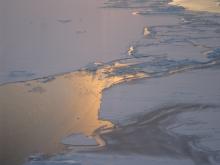
The Sea Ice Prediction Network (SIPN) announces a call for registration for an open webinar entitled "Uncertainty in Satellite-Derived Sea Ice Extent Estimates" presented by Walt Meier, NASA Goddard Space Flight Center. This webinar will focus on uncertainty in sea ice extent estimates from remotely-sensed data. Meier will discuss the current understanding of related issues and propose various methods of estimating extent uncertainty, with the aim of improving analyses of sea ice extent trends and variability. Time for participant questions will follow the presentation. This event is scheduled for Tuesday, 23 August 2016 from 10:00 a.m. to 11:00 a.m. AKDT.
SIPN Press
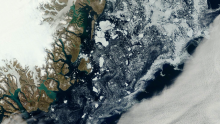
An article about SIPN, "Scientists Rally to Predict Arctic Sea Ice Melt" was published by journalist Hannah Hoag in Arctic Deeply.
PolarConnect Event: Chukchi Sea Borderland
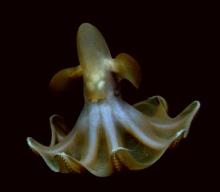
Join us for a PolarConnect event with teacher Sandra Thornton and the Chukchi Sea Borderland Research Team on Monday, 8 August 2016 at 2:00pm AKDT (3pm PDT, 4pm MDT, 5pm CDT, 6pm EDT). This event will be broadcast live from the US Coast Guard Cutter/Icebreaker Healy.
This is a real-time event with Virginia teacher Sandra Thornton and the researchers exploring marine communities from microbes to mammals and from sea ice to seafloor in this complex Arctic region. They will be sharing experiences and observations of their work aboard the Healy.
This event is hosted through the PolarTREC PolarConnect program, and participants will have a chance the learn from the scientists, ask questions, and chat with others during the presentation. Register today!
Sea Ice Outlook 2016
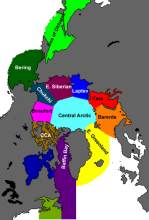
The Sea Ice Prediction Network (SIPN) announces the call for contributions for the 2016 Sea Ice Outlook August report; contributions are due Monday, 8 August. The Sea Ice Outlook provides an open process for those interested in Arctic sea ice to share ideas. The monthly reports contain a variety of perspectives—from advanced numerical models to qualitative perspectives from citizen scientists. Detailed guidelines for pan-Arctic, regional, and informal outlooks are available on the SIPN website.
TAC Make an Impact Workshop Essay

The Arctic in the Classroom (TAC) is a program created by ARCUS that partners scientists, educators, and communities to improve Arctic education. This four-year program educates K-12 teachers, students, communities, and others about the Arctic. Our goal is to identify best practices for how to administer both citizen science and community-based monitoring programs that are applicable for Arctic communities.
The Writer-in-Residence, Erica Watson wrote an essay about the "Make an Impact Workshop" that took place in March 2016, and it was published in The Arctic Institute.
2016 Sea Ice Outlook July Report Available
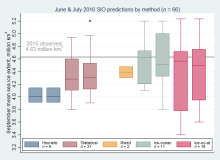
The July report for the 2016 Sea Ice Outlook (SIO) is now available! The goal of the SIO is to improve Arctic sea ice prediction on seasonal time-scales. Organizers thank all who contributed to the 37 Outlooks received for this report. The median pan-Arctic Outlook value for September 2016 sea ice extent is 4.3 million square kilometers. Contributions are based on a range of methods from advanced numerical models to qualitative perspectives from citizen scientists. The report includes discussion about dynamical model contributions and their variance, which has narrowed since the June report; discussion on predicted spatial fields, sea ice probability (SIP), and the first ice-free day (IFD) from a number of dynamical models; discussion on current conditions, recent atmospheric conditions, and probability forecasts for late summer meteorological conditions; key statements from each individual Outlook; and links to view or download individual contributions.
